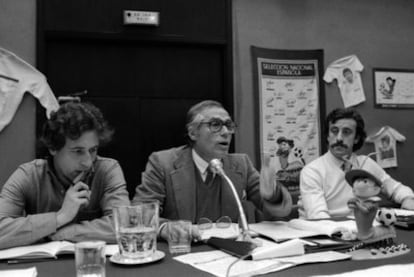"I was Racing's captain, but after the strike my name was dirt"
Veterans of previous player strikes, including Spain coach Vicente del Bosque, recall the dilemmas involved
This month's strike is not the first time such a situation has arisen in Spanish soccer, in which famous and not-so-famous players have laid careers on the line to improve the lot of fellow professionals. Today's AFE union leader Luis Rubiales remembers the contribution made by today's national coach, Vicente Del Bosque: "Without his kind, we wouldn't be here today.
Thirty years ago, Spanish sides were able to unilaterally hold on to a player simply by increasing their salary by 10 percent a year. There also existed a category of player known as the "compensated amateur," which allowed sides to pay much lower wages. Soccer players didn't even pay into the Social Security. So serious was the situation, that within a year of the AFE being set up in 1978, it had called its first strike, over two days in March 1979.
"Those were difficult times, this was during the transition to democracy, times when we soccer players needed the support of people looking to improve society... I am happy when I look back on the good intentions we had in those days," recalls Del Bosque, who at the time was a Real Madrid player who took part in the first AFE strike committee.
Atlético Madrid was the most militant side in defending players' rights. "We were initially calling for the end to the club's right to retention, as well as the age limit for third-division players, which was 23," says José Luis Capón, who played for the team between 1970 and 1980.
The strike was a success, and the stadiums were empty. Some clubs tried to pressure their players, threatening to deduct 25 percent of their salaries. "I was fined 250,000 pesetas," remembers Reina, a sum equivalent to 1,500 euros today.
The next strike took place in 1981, and interrupted the first two weeks of the season. Players were demanding back pay, and changes to the rules on allowing under-20s to play. They also called for the setting up of a fund to pay back salaries, as well as giving players a proportion of advertising revenue and broadcasting rights. The players struck again, just three weeks before the end of the same season. "I was captain of Racing Santander, and I was given a lot of flak for asking for things that today seem absolutely normal. That said, it looks as though some things never change, because we have been asking for the back-pay fund for 30 years. The outcome was that I went to play for a second-division team in Andalusia. My name was dirt, nobody would sign me," says Manolo Preciado. "And now? The LFP has no intention whatsoever of resolving this situation," says the former Racing defender, who is now Sporting Gijón's coach.
During the strike, while Preciado was putting his career on the line, Míchel was debuting with Real Madrid, against Castellón. Real fielded a youth team. Then aged 19, Míchel says he is ashamed of having broken the strike. "We were just kids. We had no idea of the bigger picture, or of the reasons that led the older players to take industrial action," he says.
"They were fighting for a better life for soccer players, and for us to be recognized as workers, workers with rights, like any other, but when you are a kid, you just want to play, and especially for Real Madrid. But let's not dwell on it," he adds.
The strike was a failure, and fell apart after one day. But just three years later, players resorted to strike action after talks over their tax status ground to a halt. "Our tax status was very complicated. For example, I was registered as though I worked in show business," says Rafael Gordillo, a Betis and Real Madrid player who was a mainstay of the national side in the 1980s, besides being a member of that 1984 strike committee.
The current dispute shows no signs of being resolved, prompting Reina to sum it up in the following terms: "The only honorable element here is the ball, which gets kicked around by everybody, but never complains."

Tu suscripción se está usando en otro dispositivo
¿Quieres añadir otro usuario a tu suscripción?
Si continúas leyendo en este dispositivo, no se podrá leer en el otro.
FlechaTu suscripción se está usando en otro dispositivo y solo puedes acceder a EL PAÍS desde un dispositivo a la vez.
Si quieres compartir tu cuenta, cambia tu suscripción a la modalidad Premium, así podrás añadir otro usuario. Cada uno accederá con su propia cuenta de email, lo que os permitirá personalizar vuestra experiencia en EL PAÍS.
¿Tienes una suscripción de empresa? Accede aquí para contratar más cuentas.
En el caso de no saber quién está usando tu cuenta, te recomendamos cambiar tu contraseña aquí.
Si decides continuar compartiendo tu cuenta, este mensaje se mostrará en tu dispositivo y en el de la otra persona que está usando tu cuenta de forma indefinida, afectando a tu experiencia de lectura. Puedes consultar aquí los términos y condiciones de la suscripción digital.








































